Linkages
Home![]() Sustainable
Developments
Sustainable
Developments ![]() Feedback
Feedback
Yokohama, Japan 01 - 04 December 1998
December 01
The third meeting of the Intersessional Group (ISG3) of the Forum is being hosted by the Government of Japan and will be held in Yokohama, 1-4 December 1998, with p
re-meetings scheduled on 30 November 1998. All meetings of the ISG, including pre-ISG3 meetings of Regional Groups, will be held at the Shin Yokohama Prince Hotel, 3-4 Shin-Yokohama, Kohoku-ku, Yokohama-shi, Kanagawa 222-0033, Japan. |
|
The Third Meeting of the Intersessional Group (ISG-3) of the Intergovernmental Forum on Chemical Safety (IFCS) will meet in Yokohama, Japan, from 1-4 December 1998. ISG-3 will open on Tuesday 1 December. Delegates are expected to meet in Plenary in the morning to hear opening remarks, address organizational matters and consider emerging issues including endocrine disrupters, persistent organic pollutants (POPs) and enhanced cooperation and efficiency in chemical management. In the afternoon, ISG-3 part icipants will begin consideration of risk assessment and hear presentations on obsolete chemicals and pesticides. (back to top) |
|
Chair Rod Rafael officially opened the Third Meeting of the Intersessional Group (ISG-3) on Tuesday, 1 December 1998. Mr. Takumi Nemoto, Vice-Minister of the Japanese Ministry of Health and Welfare, welcomed participants to ISG-3. He emphasized that ch emical safety matters must be addressed worldwide and anticipated interesting and fruitful discussions at ISG-3. Participants also heard status reports, points of concern and breaking news on emerging issues such as persistent organic pollutants (POPs) an d additional chemicals of concern and endocrine disrupters and on matters to be carried forward to IFCS-3. In the afternoon ISG-3 participants considered international assessment of chemical risks. Several delegates, including representatives of the International Programme on Chemical Safety, International Council of Chemical Association, European Chemical Ind ustry Council and the US Environmental Protection Agency, delivered presentations highlighting risk assessment activities. In the following discussion, delegates stressed the importance of avoiding duplication of efforts, ensuring quality control in data collection, making data publicly available and increasing transparency of initiatives. Delegates also emphasized the need to address other programme areas such as chemical classification and labeling, and to consider the role of the IFCS within risk asses sment initiatives. Participants also began to address obsolete chemicals/pesticides. (back to top) |
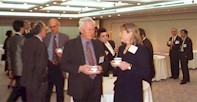 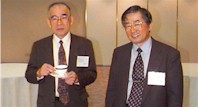 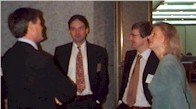 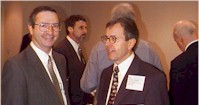 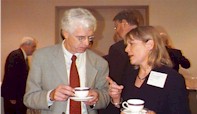 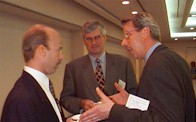  |
|
On Wednesday morning participants met in three parallel working groups to consider obsolete chemicals and pesticides, followed by regional meetings. The three working groups addressed: inventories and management of obsolete chemicals; inventories and m anagement of obsolete pesticides; and government, donor, bank and industry roles and responsibilities in cleanup and prevention of obsolete pesticides. In the afternoon plenary session participants heard reports from the three working groups and assessed the quality and completeness of the outcomes from their deliberations. Participants then heard initial presentations on capacity building activities from UNITAR, IOMC, OECD, NIGERIA and others, and began deliberations on the topic. (back to top) |
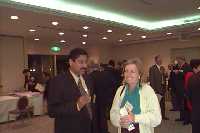 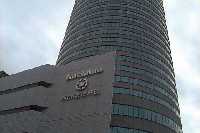 |
|
On Thursday, 3 December, ISG-3 delegates met in two parallel working groups in the morning to discuss priority topics for national capacity building and innovative approaches and partnerships for capacity building. Delegates then met in Plenary sessions t o consider harmonization of classification and labeling, the role of NGOs in the IFCS and future support for NGO participation, and matters to be carried forward to Forum III. In afternoon Plenary, the US proposed that ISG-3 issue a Chemical Safety Adviso ry regarding the potential impact of the year 2000 computer "millenium bug" problem (Y2K). Delegates also discussed a proposed IFCS Strategy on PCBs. (back to top) |

